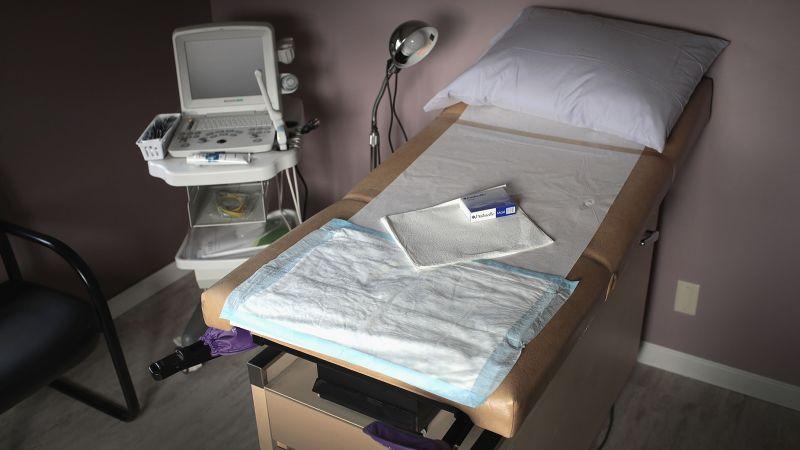Patients have a right to privacy when it comes to their medical information, even when they travel to another state for an abortion, IVF, birth control or other types of reproductive health care, federal officials declared in a new rule.
The final rule, called HIPAA Privacy Rule to Support Reproductive Health Care Privacy, was announced Monday and prohibits the disclosure of a patient’s health information as it relates to reproductive health care, as well as strengthens privacy protections for that patient, their family and their doctors who are providing or facilitating the care.
“This rule prohibits those regulated by HIPAA — health care providers, health plans, clearing houses and their business associates — from using or disclosing a person’s protected health information to conduct an investigation into or impose liability on any person for merely seeking, obtaining, providing or facilitating lawful reproductive health care, including abortion,” Rainer said, referring to the Health Insurance Portability and Accountability Act of 1996.
“If a person receives reproductive health care, such as a pregnancy test or treatment for an ectopic pregnancy, and that reproductive health care is lawful in the state where the care is received, the information about the care cannot be disclosed or used by the health care provider or health plan for an investigation, or to impose liability by law enforcement on the patient or the provider,” she said.
Last year, the Office for Civil Rights published proposed changes to the HIPAA Privacy Rule and received nearly 30,000 comments from the public in response to what the final rule should involve, according to the US Department of Health and Human Services.
Now, the final rule serves as one part of an ongoing effort by the Biden-Harris administration to protect access to reproductive health care after the overturning of Roe v. Wade, said HHS Secretary Xavier Becerra.
“Each and every American still has a right to their privacy, especially when it comes to their very private, very personal health information,” Becerra said Monday.
Many patients living in states with abortion restrictions have had to travel to states without restrictions in order to receive care, Rainer said Monday.
Federal officials declared in a new rule that patients have a right to privacy regarding their medical information, even if they travel to another state for reproductive health care, such as IVF, birth control, or abortion.
A patient’s health information related to reproductive health care cannot be disclosed, and the final rule, known as the HIPAA Privacy Rule to Support Reproductive Health Care Privacy, was unveiled on Monday. It also enhances privacy protections for the patient, their family, and any physicians who are assisting or supplying the care.
In other words, even if a patient travels to another state for reproductive health care, the rule prohibits medical records from being used against them, according to Melanie Fontes Rainer, director of the Office for Civil Rights, who made this announcement on Monday at a press conference.
In reference to the Health Insurance Portability and Accountability Act of 1996, Rainer stated, “This rule prohibits those regulated by HIPAA — health care providers, health plans, clearing houses and their business associates — from using or disclosing a person’s protected health information to conduct an investigation into or impose liability on any person for merely seeking, obtaining, providing or facilitating lawful reproductive health care, including abortion.”.
The information regarding the care cannot be disclosed or used by the health care provider or health plan for an investigation, or to impose liability by law enforcement on the patient or the provider, she said, if the patient receives reproductive health care—such as a pregnancy test or treatment for an ectopic pregnancy—and the state in which the care is received permits it. Additionally, based on this rule, reproductive health care—such as contraception—that is protected, mandated, or authorized by federal law, including the Constitution, may not be used or disclosed. “.
Ultimately, according to Rainer, “no one should have to live in fear that their conversations with their doctor or that their medical claims data might be used to target or track them for seeking lawful reproductive health care.”.
According to the US Department of Health and Human Services, the Office for Civil Rights received nearly 30,000 public comments last year regarding proposed changes to the HIPAA Privacy Rule and what should be included in the final rule.
Now that Roe v. was overturned, the final rule is one component of the Biden-Harris administration’s ongoing efforts to safeguard access to reproductive health care. HHS Secretary Xavier Becerra stated, “Wade.”.
In particular, when it comes to their very private, very personal health information, every American still has a right to privacy, Becerra stated on Monday. It is your right to privacy under federal law. Ensuring that Americans who disclose highly sensitive health information to a provider are aware of their rights is the main goal of today’s activities. “.
At the moment of the new rule, abortion is completely illegal in 14 states.
In the aftermath of the June 2022 ruling in Dobbs v. Due to the Jackson Women’s Health Organization, which abolished the nation’s constitutional right to an abortion, almost two dozen US states now forbid or restrict access to the procedure. Maternal and newborn mortality rates are higher, and economic insecurity is higher, in the states with the lowest rates of abortion.
According to Rainer on Monday, many patients who reside in states where abortion is prohibited have been forced to travel to states where abortion is not restricted in order to receive care.
According to Rainer, the new rule guarantees that “a woman’s medical records will be protected when she travels from one state where the care might be banned to another state to receive lawful reproductive health care, regardless of what that healthcare is — whether it’s a pill, a procedure, or it’s just a medical examination” after she returns home.
According to Rainer, “Herself, her providers, her home providers—who had nothing to do with the care she received in the first place—will be protected and able to say, ‘No, you cannot have this information.'”. One of the primary objectives of this rule is to enable women to seek medical attention despite the disarray of laws currently in place across the nation. The provider in the state she traveled to will also be shielded from people attempting to obtain that kind of care. “.
In many state legislatures and courts, the debate over abortion is still ongoing. Most recently, on April 9, the Arizona Supreme Court upheld an 1864 statute that forbade abortion under almost all conditions and had its roots in the Civil War era. In the interim, the existing 15-week ban is still in effect, but the decision has been postponed for two weeks.
Furthermore, this week, the US Supreme Court will hear a challenge to Idaho’s nearly complete ban, having heard arguments in a case against the abortion pill in March. On May 1, Florida will implement a six-week ban in place of the current 15-week prohibition.
Even though the new final rule is a step in the right direction toward defending women’s reproductive rights in the US, Becerra noted that it won’t totally reverse the effects of Roe v. Wade has affected patients all around the nation.
“We don’t think that any of the things the President has asked us to do with our power will reverse Dobbs,” Becerra declared. “Dobbs violated people’s rights. Until a national legislation reinstituting Roe v. We’re going to have problems, Wade. “.




